Portrait of the Artist: An Oral History of David Berman at UVA
In the summer of 1987, Gate Pratt, an architecture undergraduate at the University of Virginia, was looking for someone to …
In the summer of 1987, Gate Pratt, an architecture undergraduate at the University of Virginia, was looking for someone to rent a room in the large, brick house he lived in on 14th Street.
Friends introduced him to David Berman, a tall, witty poetry student who, like Pratt, was a DJ at WTJU. The two hit it off immediately and soon started a band called Ectoslavia, a name meant to sound like an imaginary country.
They practiced noisily in the basement of their home, which was known as the Red House.
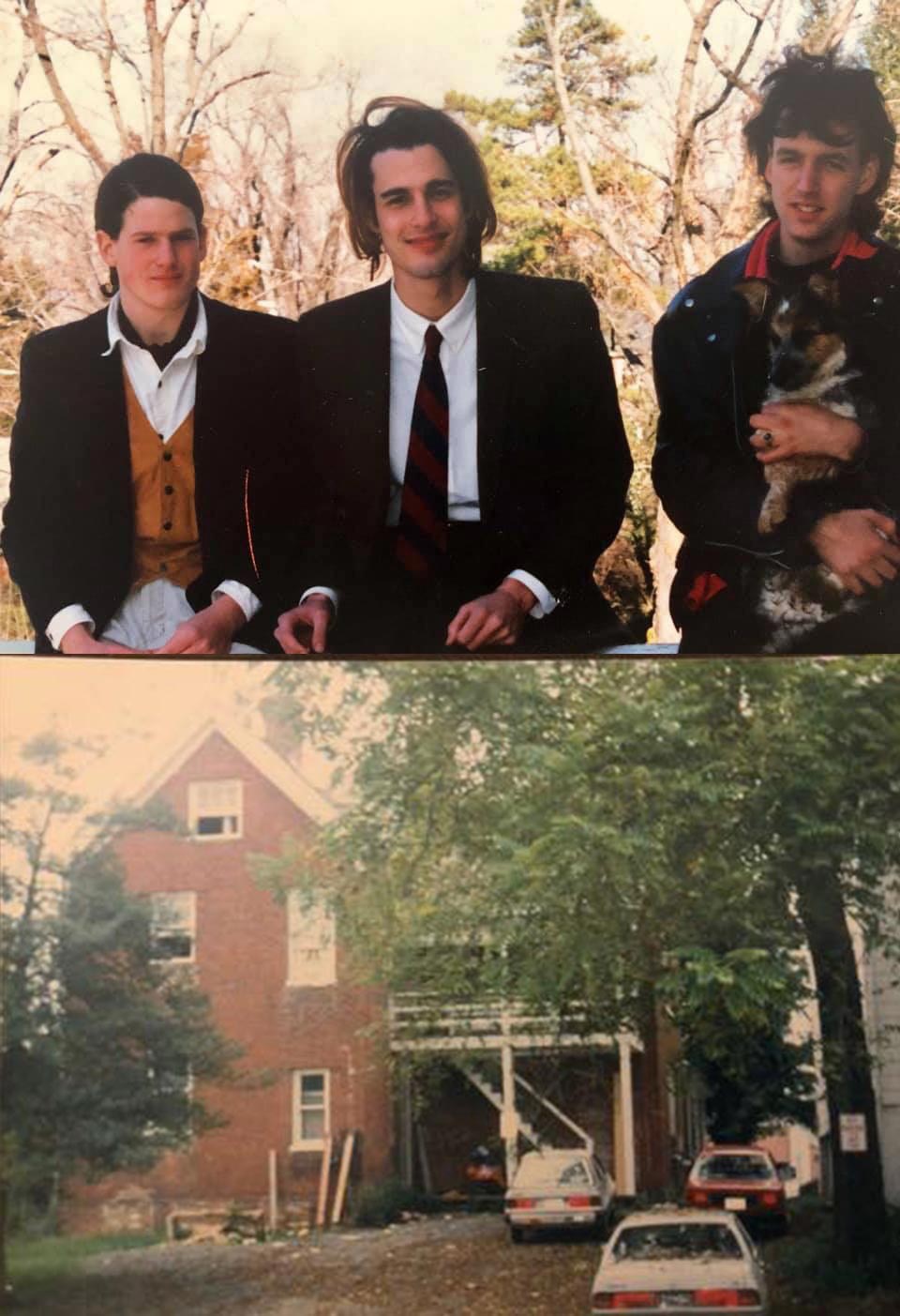 UVA students, from left, Rod Beaver, David Berman and Gate Pratt lived in the Red House, below, together from 1987 to 1989. (Photos courtesy Laura Anderson and Bryant Mason)
UVA students, from left, Rod Beaver, David Berman and Gate Pratt lived in the Red House, below, together from 1987 to 1989. (Photos courtesy Laura Anderson and Bryant Mason)
Ectoslavia was an inclusive band. Its members were “more or less whoever was in the house at any given time,” Pratt said. “We would just go down to the basement and make a racket.”
The members of Ectoslavia – all UVA students – were DJs at WTJU, bus drivers for the University Transit System, and employees of Plan 9 Records on the Corner. They were invested in the indie-rock scene, going to shows at local clubs like Trax and the Mineshaft and carpooling together to larger venues in Richmond, Washington, D.C., and New York.
The music coming from the basement of the Red House may have been, as Pratt says, “primitive,” but Ectoslavia’s alumni include Bob Nastanovich and Stephen Malkmus, who went on to form the indie-rock band Pavement after graduating from UVA, as well as James McNew, now the bassist for the band Yo La Tengo.
David Berman, considered by his friends to be the creative “leader” of the Red House, started the band Silver Jews, which produced six albums from the early ’90s to the late aughts. Nastanovich and Malkmus played on some of the early albums. Berman’s songs gained a cult following for their lyrical brilliance.
Berman, who remained a creative collaborator with Malkmus, Nastanovich, Pratt and others for decades, died in August by suicide. He had just released a new album, “Purple Mountains,” with a band of the same name.
Fans and music journalists, including UVA alumnus and Rolling Stone columnist Rob Sheffield, wrote tributes and remembrances in the days after the news broke, recalling Berman’s songwriting gifts, as well as his deep kindness. Pratt and other UVA friends organized a memorial celebration to be held this Saturday from 2 to 10 p.m. at WTJU’s studios on Ivy Road.
The event, which is open to the public, will include on-air programming and live performances of Berman’s music, a reading from his book of poetry, and a pop-up display of Berman’s letters to his UVA poetry professor, Charles Wright, from Wright’s papers in the UVA Special Collections Library.
Many former inhabitants of the Red House and members of Ectoslavia will travel back to Charlottesville for the memorial. Here, they remember their friendship with Berman, as well as Charlottesville’s college-rock music scene during the ’80s and ’90s.
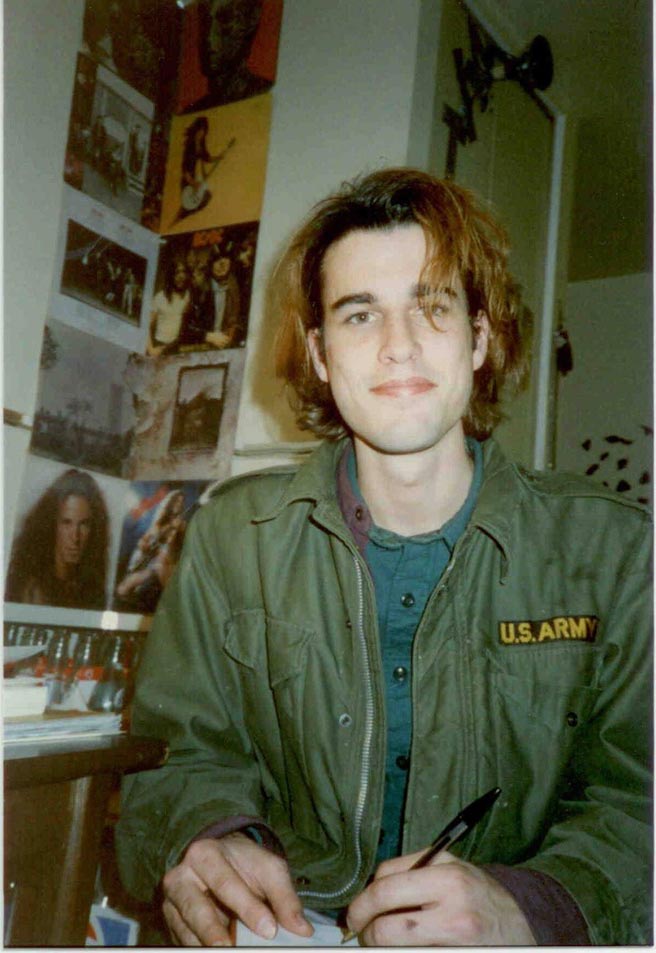
David Berman hosted a radio show called “The Big Hair Show” in the late ’80s at WTJU. (Photo by Aaron Margosis)
Bob Nastanovich (Class of 1989, member of Pavement, early member of the Silver Jews): I met David in the dorms. I lived in the old dorms in Hancock, and he lived in Watson with the Echols Scholars.
As soon as I got to UVA, I met this guy Maynard Sipe – he would book all the cool shows in town, whether they be Trax or C&O or the Mineshaft. So, I introduced myself to him right off the bat. He was looking for somebody to put up flyers of the upcoming shows in all the dorms. In exchange I got in free to all the shows. You know, you’re very self-conscious when you’re 18. You think, “Well everybody will think I’m cool because I’m the guy putting up the flyers.”
So, David noticed – Who’s the guy who keeps going around putting up the flyers for all the good shows in town? This was in the first couple months that I was at UVA. And then of course, he was one of about maybe a half-dozen first-year students that would go see the bands, so we basically kept seeing each other at the same shows.
Laura Anderson (Class of 1989): I met David on the first day of my first year. Rob Chamberlin [a friend of Berman’s] and I grew up together, and he and David came to Bonnycastle to say hello. I’ll never forget seeing them walk down the hall; they were both so tall and strikingly handsome and really stood out from the people I had met so far in the Old Dorms.
Kylie Wright (Class of 1988, member of Ectoslavia, WTJU DJ): I met David in 1985. I was a second-year student and he was a first-year, and we were born two days apart. I always liked that [first-year] class because I was kind of young for my class and they were all my age. I remember going to a Cure Show with David and Bob Nastanovich. We all drove up to D.C. to the Warner Theater, and we had tickets way, way in the back; it was assigned seats. And David made the charge to drag us all forward and we somehow managed to talk our way into almost the front of the stage, which was all David’s doing.
Darius Van Arman (founder of record label Jagjaguwar, co-owner of Secretly Group record label, attended UVA in the 1990s): I met David in the mid-’90s through Gate Pratt. I got to know Gate through WTJU and just being in the community. Gate had built a slight extension to his home and I lived in that extension. David was coming back to Charlottesville and lived with us briefly while looking for a home. … Part of what I will always remember about David Berman was that his first instinct was to lift people up around him, and to be supportive and to be inclusive.
Nearly everyone who spoke to UVA Today lived in the Red House in some capacity.
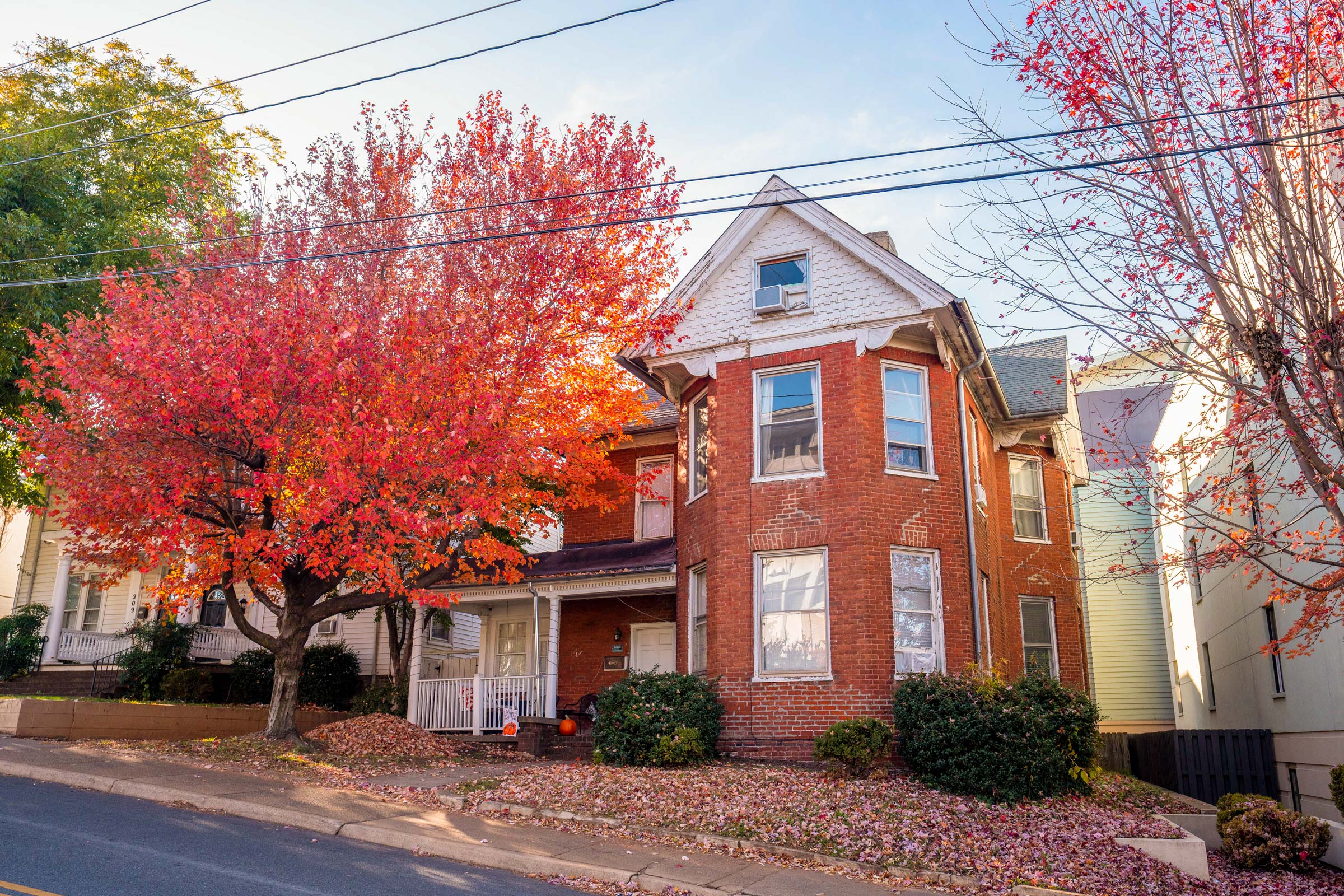 The Red House on 14th Street as it stands today. (Photo by Sanjay Suchak, University Communications)
The Red House on 14th Street as it stands today. (Photo by Sanjay Suchak, University Communications)
Nastanovich: The actual residents were David, Gate Pratt, Rob Chamberlain, Mike Heny and Rod Beaver and a guy named Jeff Honkert. Malkmus never lived in the Red House. I lived across the street. But then my third year, I lived way out JPA Extended somewhere, which, as it turned out, was too far away from where my friends were. So, I lived several months in the kitchen at the Red House. I lived in the kitchen, on the couch, and the heat didn’t work, so I predominantly lived underneath the cushions of the couch. This would have been 1987 or so.
I would be a frequent overnight guest, but then it got to the point … You know how you actually live somewhere when you move your toiletries in?
It was an amazing house because the first floor had a full kitchen, and then the second floor had a full kitchen. And then there were tons of attics, and there were places I don’t think I ever went.
Pratt: The Red House was a place where musicians, artists, poets, writers lived. It was one of a handful of houses where people who weren’t in the Greek scene ended up – DJs, architects and artists. Before I lived there, I’d heard for a long time that it had been a music house – there had been bands there in the ’70s through the ’80s.
Wright: A week before my thesis show was about to go up in 1988 – I was a studio art major – our house burned down. It was on Shamrock. A day later, David Berman wrote us a letter saying, “I’m sorry your house burned down, you are hereby welcome to come live in the attic of the Red House as long as you want but just DON’T FREAK OUT,” in gigantic letters. And then he always had these weird little dunce-cap-guy drawings. We lived in the attic of the Red House for a summer, which was the hottest place on earth, but at least it was a place to stay.
On the early days of Ectoslavia:
Nastanovich: I was one of the original members of Ectoslavia. At first it was just a bunch of us making a racket in the basement. Just making a lot of noise. I was one of the percussionists. And then, subsequently it developed into more of a real thing.
Wright: I played in Ectoslavia, along with many other people, whoever happened to be around. It was very much a collaborative effort on our parts. My strongest memory was electrocuting myself in the basement of the Red House because I was playing bass barefooted and it wasn’t grounded. So that was a little frightening. We were terrible. We were really awful, but we had fun.
Pratt: It was a house band. When we were done with classes in the evening, we would make some music in the basement.
The band is semi-notorious [because of the musicians who emerged from it]. The funny thing is, everyone wants to hear the recordings, of which there are a few, but they’re really awful. They’re really noisy and very primitive, and you know, for the fact that several notable musicians came out of it you would never necessarily have guessed by listening to the stuff we were doing.
We did get organized and we did actually play some shows around Virginia at some point.
Anderson: We all went to see Ectoslavia later in college. Also DooM, an earlier band of David’s, Rob’s and Bryant Mason’s. It was a really close group of friends, anchored by the Red House, WTJU and various workplaces (Plan 9 Records, Eastern Standard, the C&O).
Nastanovich: One of the great things about a large public university is that there are a lot of talented people there. In a situation like Charlottesville, the process of them then getting to know each other and become friends and spend a lot of time together is part of the process of that sort of creativity all coming together.
Berman hosted a rock show with Rob Chamberlin on WTJU called “The Big Hair Show.” WTJU served as a link between Berman’s friends in the late’80s and helped support the local music scene.
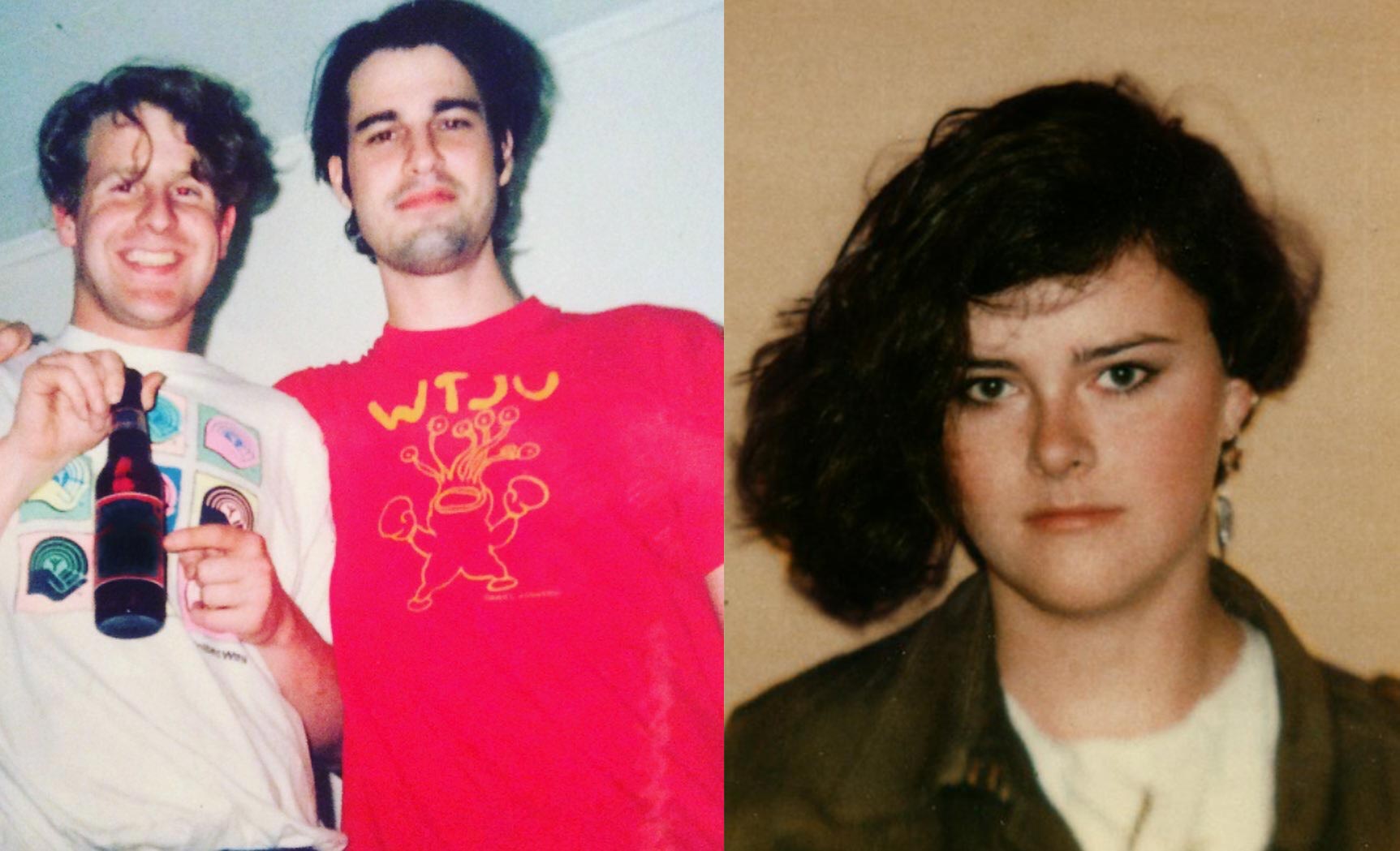 Left: Bob Nastanovich and Berman met their first year at UVA. They went on to collaborate on musical projects and bands including Pavement and the Silver Jews. Right: Kylie Wright was an original member of Ectoslavia. (Photos courtesy Laura Anderson and Kylie Wright)
Left: Bob Nastanovich and Berman met their first year at UVA. They went on to collaborate on musical projects and bands including Pavement and the Silver Jews. Right: Kylie Wright was an original member of Ectoslavia. (Photos courtesy Laura Anderson and Kylie Wright)
Wright: I was a DJ at WTJU from ’87 to ’88. I had a show called “Jane Fonda’s Blackout.”
Nastanovich: My show was called “The Dolphin Field,” named after an early Meat Puppets EP. And then I became the station manager the last year I was there. But of course, all of us had to start off doing shows from 2 to 6 in the morning. And then subsequently we grew to gain the midnight-to-2 a.m. slot, which was pretty precious.
Anderson: This was the golden era of college rock, and there were so many excellent bands around – all getting played on WTJU, which was one of the best college stations in the country. David and Bob were always great about making tapes for their friends, or you could just go to the station and listen to their shows.
Nastanovich: David’s show was good. Although they did play, like, Guns N’ Roses. … I’m just being sarcastic. His show was great. He’s not here to defend himself anymore. He was a really good DJ.
Among his friends and professors, Berman stood out as a gifted writer.
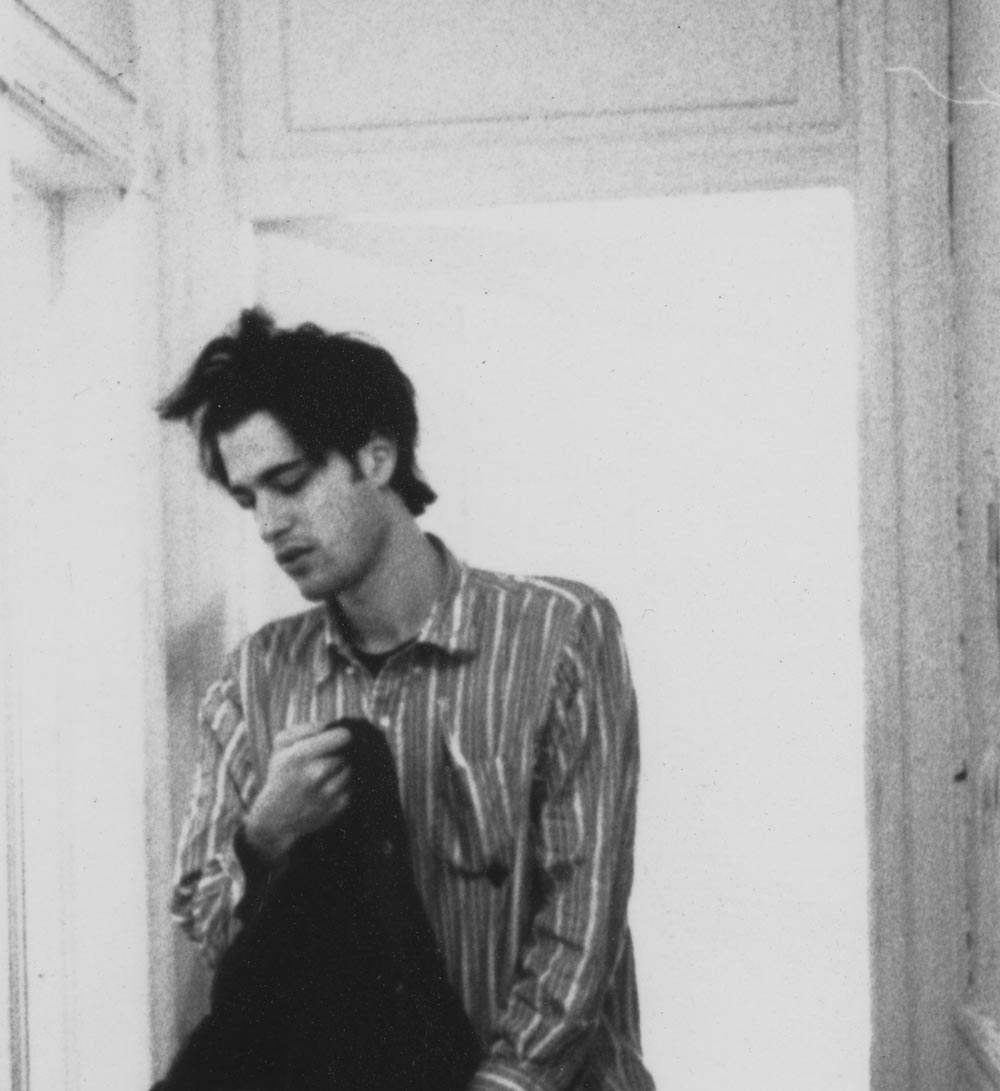 David Berman circa 1991, in the Hoboken apartment that he shared with Bob Nastanovich and Stephen Malkmus, where the band Silver Jews was born. (Photo by Kylie Wright)
David Berman circa 1991, in the Hoboken apartment that he shared with Bob Nastanovich and Stephen Malkmus, where the band Silver Jews was born. (Photo by Kylie Wright)
Pratt: He was very good at just putting words down on a page. He wanted to be known as a poet more than a musician. The musician aspect was fun and convenient for him in some ways, but in other ways it was an albatross for him because he didn’t want to be a musician, he wanted to be a poet. … He was always a writer.
Van Arman: With regards to his words and music, I think David was an extraordinary communicator. The way he communicated was both highbrow and lowbrow at the same time. And so, it was very open and let anyone really get into it. It was consistent with his generosity as a person.
Nastanovich: With David, his songs eventually would be built around his lyrics. He’s one of the only songwriters that I’ve ever worked with that started with a poem, and then you built the song around the poem. That’s pretty unusual. … Throughout the course of his experience at UVA, his writing ability was celebrated by the writing professors there, many of whom are well-decorated, like Charles Wright. The fact that they admired David’s work and viewed David as a peer probably gave him the first surge of confidence that he ever had in his life.
David was an unusually gifted poet, and then Malkmus was an unusually talented guitar player and songwriter. And so that was sort of an interesting thing. I realized when I was 18, 19 years old that two of my best friends in college are these unusually talented people. I kind of felt like I was in a position of responsibility as one of their best friends, to bring these two guys together.
Charles Wright (Pulitzer Prize-winning poet, UVA professor emeritus of creative writing): David was a terrific student and a good writer. He took a couple of my classes and stayed in touch. I encouraged him to go up and work with Jim Tate in Massachusetts to get his M.F.A.
Berman went to graduate school for creative writing at the University of Massachusetts in the mid-1990s and published a book of poems, “Actual Air,” in 1999.
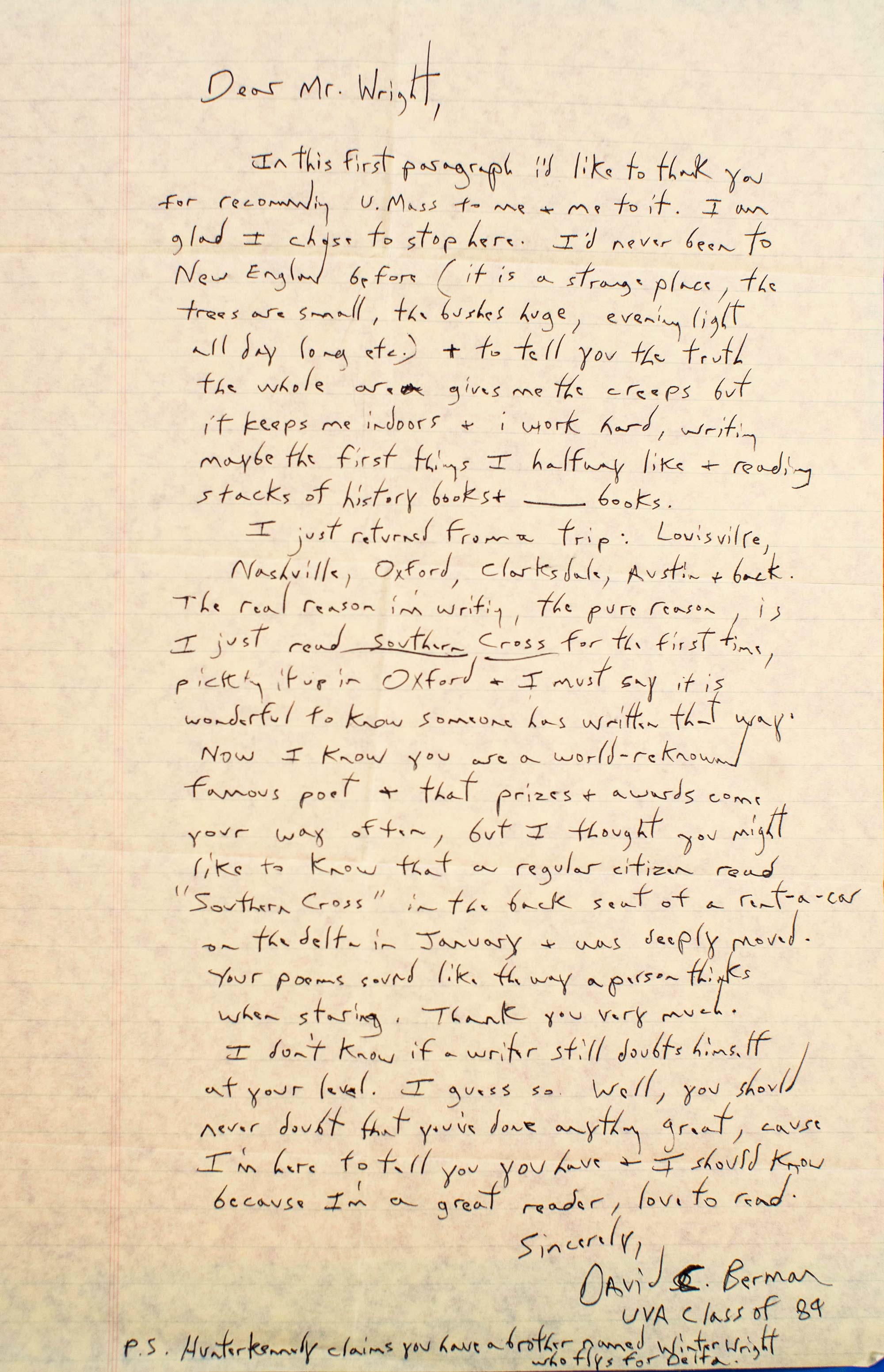 This letter from Berman to Charles Wright includes a line that later appeared in the Silver Jews song “Trains Across the Sea,” according to UVA librarian Steven Villereal. (Photo by Sanjay Suchak, University Communications)
This letter from Berman to Charles Wright includes a line that later appeared in the Silver Jews song “Trains Across the Sea,” according to UVA librarian Steven Villereal. (Photo by Sanjay Suchak, University Communications)
Kylie Wright: I saw him in 1999 at a reading in New York for “Actual Air.” David never really knew what to do with fandom. He seemed happy that people [at the reading] knew him from before, when he was just David.
Before graduate school, Berman lived in New Jersey with Nastanovich and Malkmus. The three worked somewhat menial jobs during the day and wrote music at night.
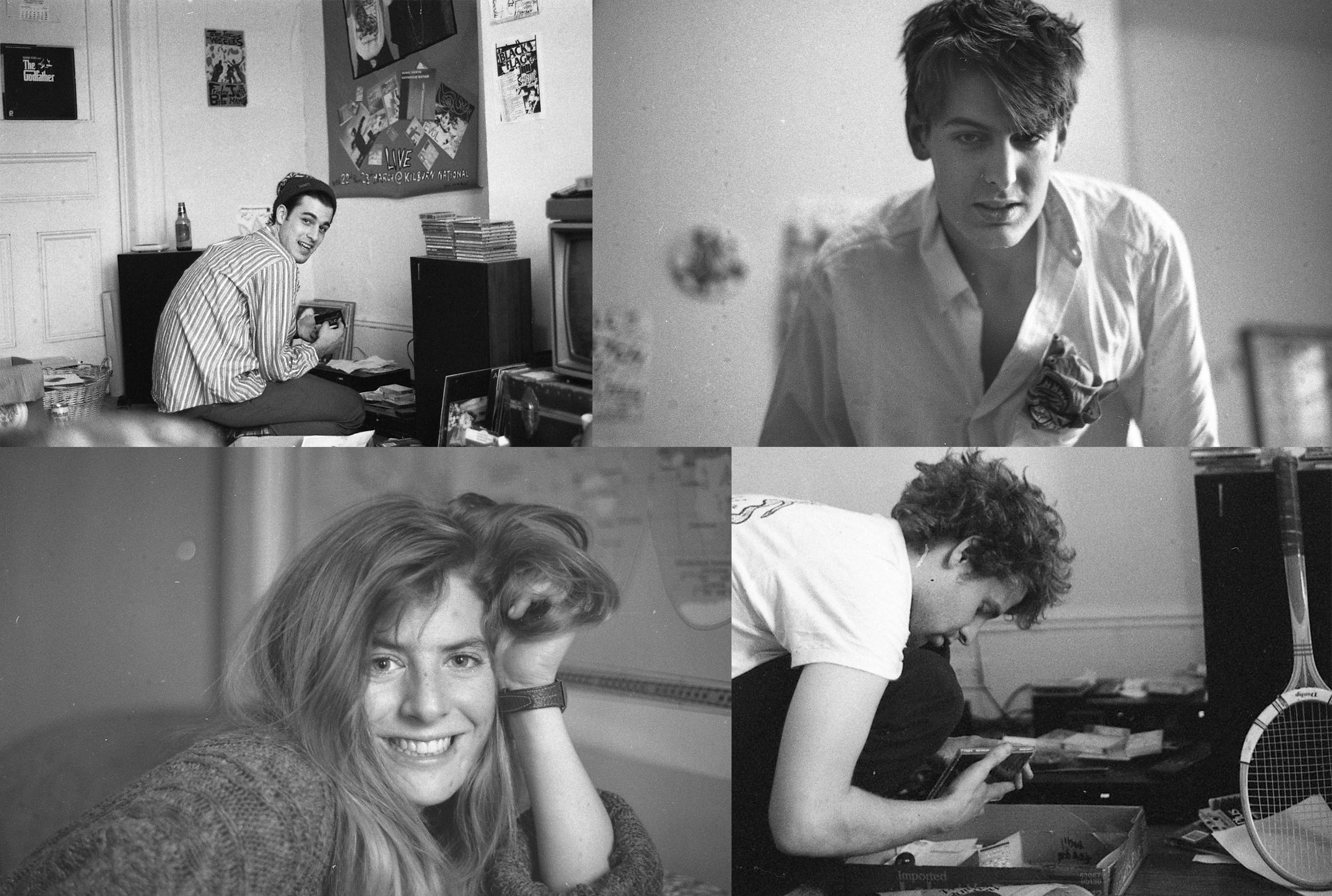 Kylie Wright took these photos of, from top left, Berman, Stephen Malkmus, Laura Anderson and Bob Nastanovich in the apartment in Hoboken in the early ’90s.
Kylie Wright took these photos of, from top left, Berman, Stephen Malkmus, Laura Anderson and Bob Nastanovich in the apartment in Hoboken in the early ’90s.
Nastanovich: We lived in a tiny apartment in Willow Avenue [in Hoboken]. It was a basement apartment. It was where the Silver Jews started. One of the reasons why we were able to play there was we had a delightful symbiotic relationship with the family that lived on the floor above us. They were kind of 24-hour-party people, so we could make as much noise as we wanted in the basement. That was beneficial to the early days of Silver Jews.
Kylie Wright: In the summer of 1991, I was living on the Upper West Side and I didn’t have a job and didn’t have anything to do. David and Stephen Malkmus were working as guards at the Whitney Museum of Art, so I would just walk across Central Park every day in the blazing heat and I would just go hang out at the Whitney and David would just tell funny stories. I mean, they were bored out of their minds half the time, just standing around.
They were always complaining that they had to wear these blue polyester blazers as part of their guard uniform. And they would sweat in them. And they weren’t allowed to lean against the walls, because if they did it would leach blue dye onto the white walls.
Nastanovich: I drove a bus in New York from 1989 to ’93. So those guys would talk about how arduous being a security guard was at the Whitney Museum while they were getting a full education on American art there. I’d have to listen to them kind of moan about standing all day, and meanwhile I drove a bus all day.
Charles Wright: I remember seeing David at the Whitney Museum; he was working as a security guard. I passed him by and then stopped and said hello.
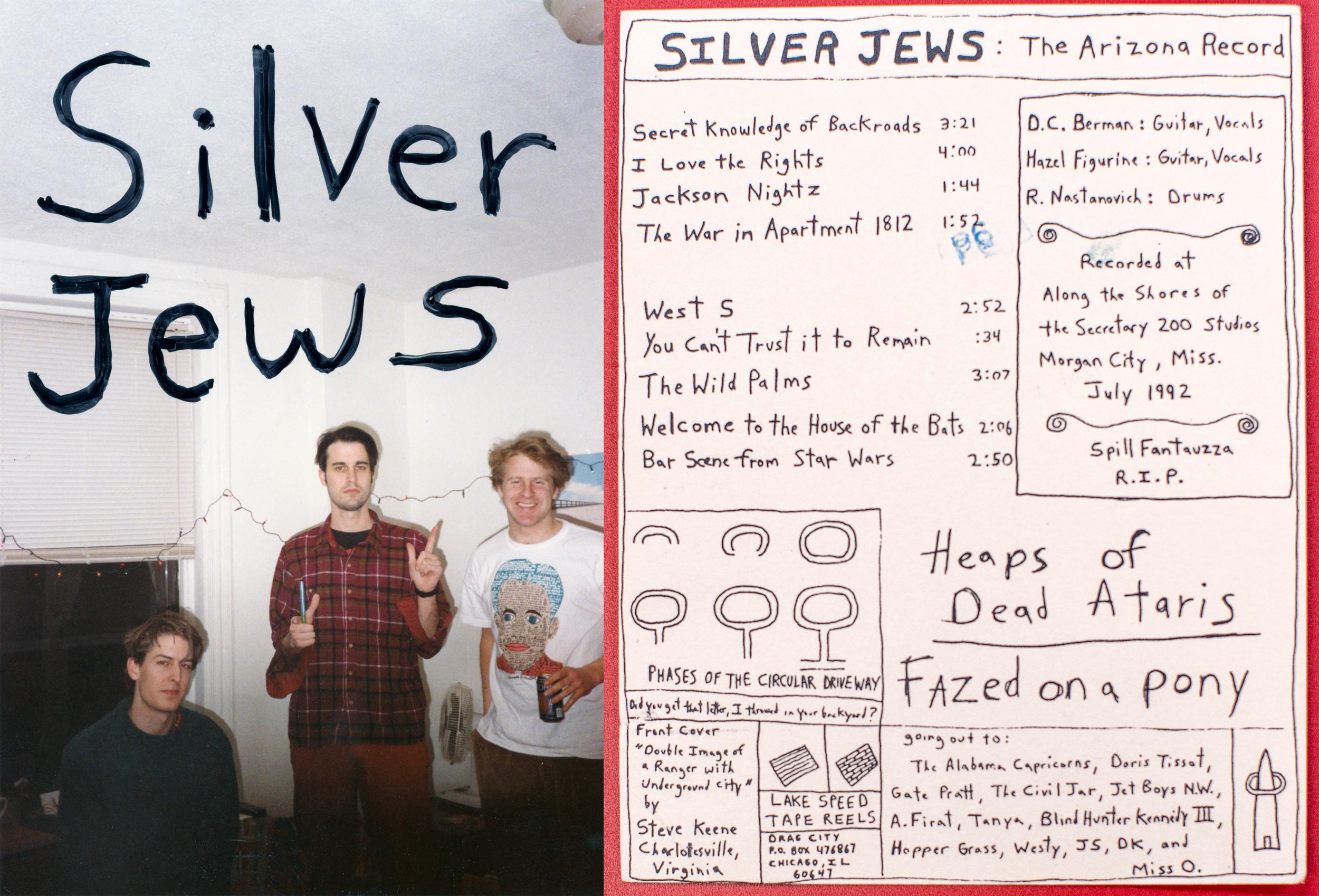 Left: This photo of Malkmus, Berman and Nastanovich from the early ’90s became the cover of the 2012 Silver Jews compilation album, “Early Times.” Right: Berman’s postcard to Charles Wright illustrates his plans for the Silver Jews 1993 EP, “The Arizona Record.” Berman used “Hazel Figurine” as a code name for Stephen Malkmus. (Photos courtesy Drag City and Sanjay Suchak, University Communications)
Left: This photo of Malkmus, Berman and Nastanovich from the early ’90s became the cover of the 2012 Silver Jews compilation album, “Early Times.” Right: Berman’s postcard to Charles Wright illustrates his plans for the Silver Jews 1993 EP, “The Arizona Record.” Berman used “Hazel Figurine” as a code name for Stephen Malkmus. (Photos courtesy Drag City and Sanjay Suchak, University Communications)
In the mid-’90s, Berman returned to Charlottesville for a time and became a fixture in the local music scene.
Van Arman [who booked shows for the music venue in the basement of Tokyo Rose restaurant]: At that time I was one of the rock directors at WTJU. The scene in Charlottesville in the ’90s – there wasn’t really a commercially successful independent music scene. So, Tokyo Rose and WTJU were championing a lot of music from elsewhere and trying to integrate our local community of artists with artists from around the world and around the country.
For me, part of getting to know David, too, was also bringing in some Drag City artists, the label he was on, to play at Tokyo Rose. I think the very first show that I was a part of booking was Smog, which was the artist Bill Callahan, on Drag City.
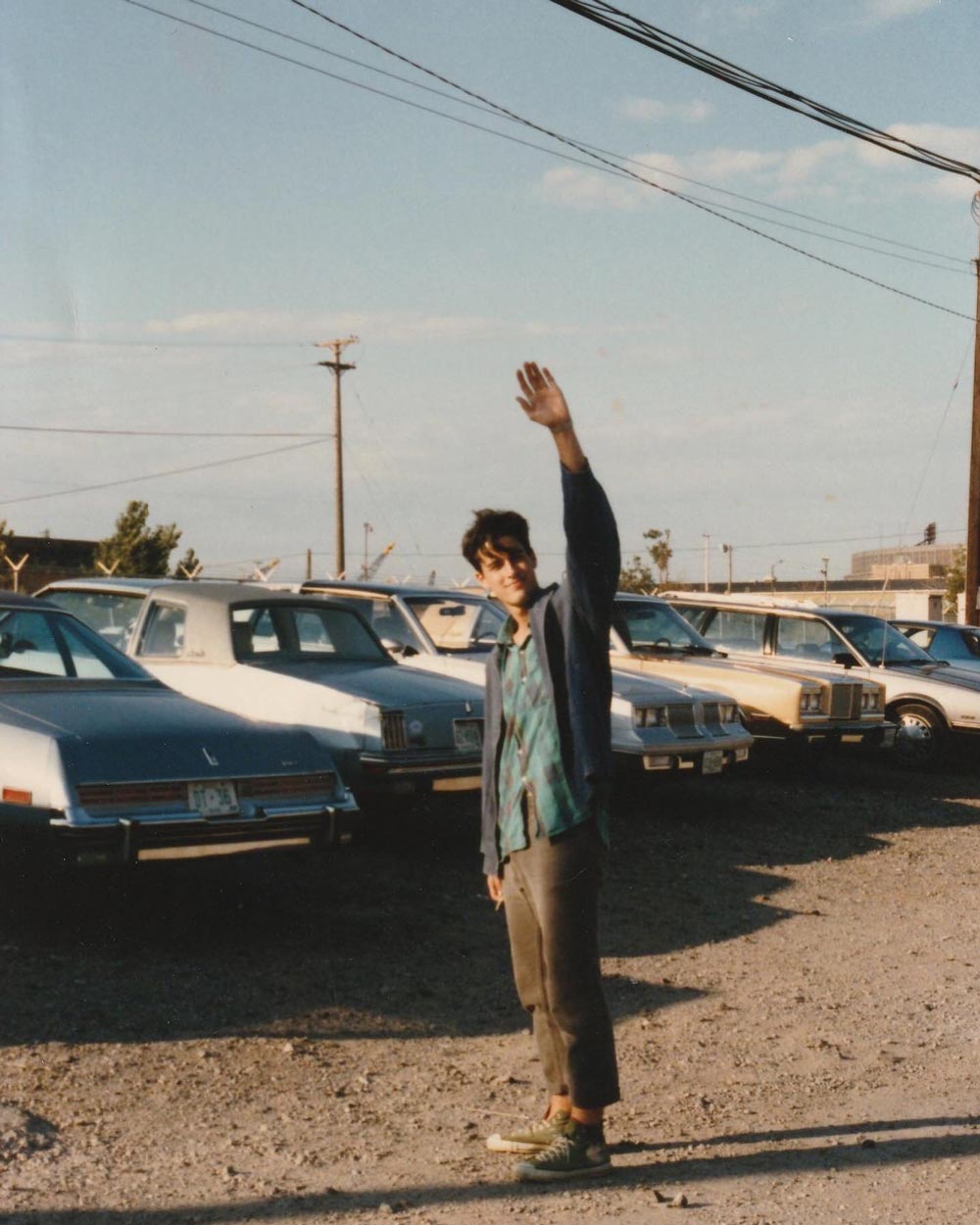 An undated photo of Berman. (Photo courtesy of Laura Anderson)
An undated photo of Berman. (Photo courtesy of Laura Anderson)
Emily Smith (Class of 1999, WTJU DJ and a fan of Berman’s music): The first time that I heard “American Water” by the Silver Jews upon its release, my [college] friends and I sat in quiet silence. We marveled over the record’s sublime imagery, playing it on repeat. I think that David’s lyrics and music helped us connect not only with one another, but also with ourselves.
His personal stories set to music were heart-opening. For me, he provided safety and solace. His songs became a feature of my mix tapes from that time. During my stint as a WTJU DJ in Charlottesville, we played many of his songs at the station. I remember receiving phone calls from appreciative music fans during our overnight time slot.
I think that David’s stories fostered a profound sense of inclusion. The shared experience of David’s music fostered a deep connection with fellow music lovers from UVA who are among my closest friends still today.
Van Arman: Part of what was so important to me in getting to know him, was that at the time, he was older than me, he had gone out into the world and had gotten a poetry degree, he was in the Silver Jews and he was super-cool, and he was colleagues with Pavement and Pavement was super-cool at the time. And I was in my 20s, just trying to figure out the world, and lacking a lot of confidence. David was this big brother to me. He was so generous in connecting the dots for me. He made me feel like I could do a lot. And he wasn’t exclusive.
Even as an undergraduate student, Berman exuded kindness and creative leadership, his friends say.
Kylie Wright: I feel incredibly lucky to have been there at that exact time and that place and with this group of people, many of whom I haven’t seen for 30 years. We all learned to be creative from David, in a way. He was the epicenter of this energy. He was a great role model in that he was never afraid to just not box himself in. He wasn’t just a musician or just an artist; he wasn’t any one thing. He just made work, probably because his devils pushed him to be doing that, but it gave me a template of how to live life as a creative person. And I think that was really important – for a lot of us that really became the thing.
I’m a photography professor now. My students come boppin’ in to class with Pavement T-shirts, and I say, “Oh, Pavement!” And they’re like, “That’s a band.” And I say, “Yeah. I know. I know Steve Malkmus.” And then they look at me like I’m either making it up or insane.
Pratt: David always had notebook and phrases and things like that that were a lot of fun to read at the time. He actually taught me the habit of keeping a small book in my back pocket to write down ideas because you know they come and go so quickly. I adopted the habit. I have a book in my back pocket at this very moment full of ideas.
Pratt had stayed in touch with Berman since graduation and saw him this summer as Berman was preparing for his new album tour.
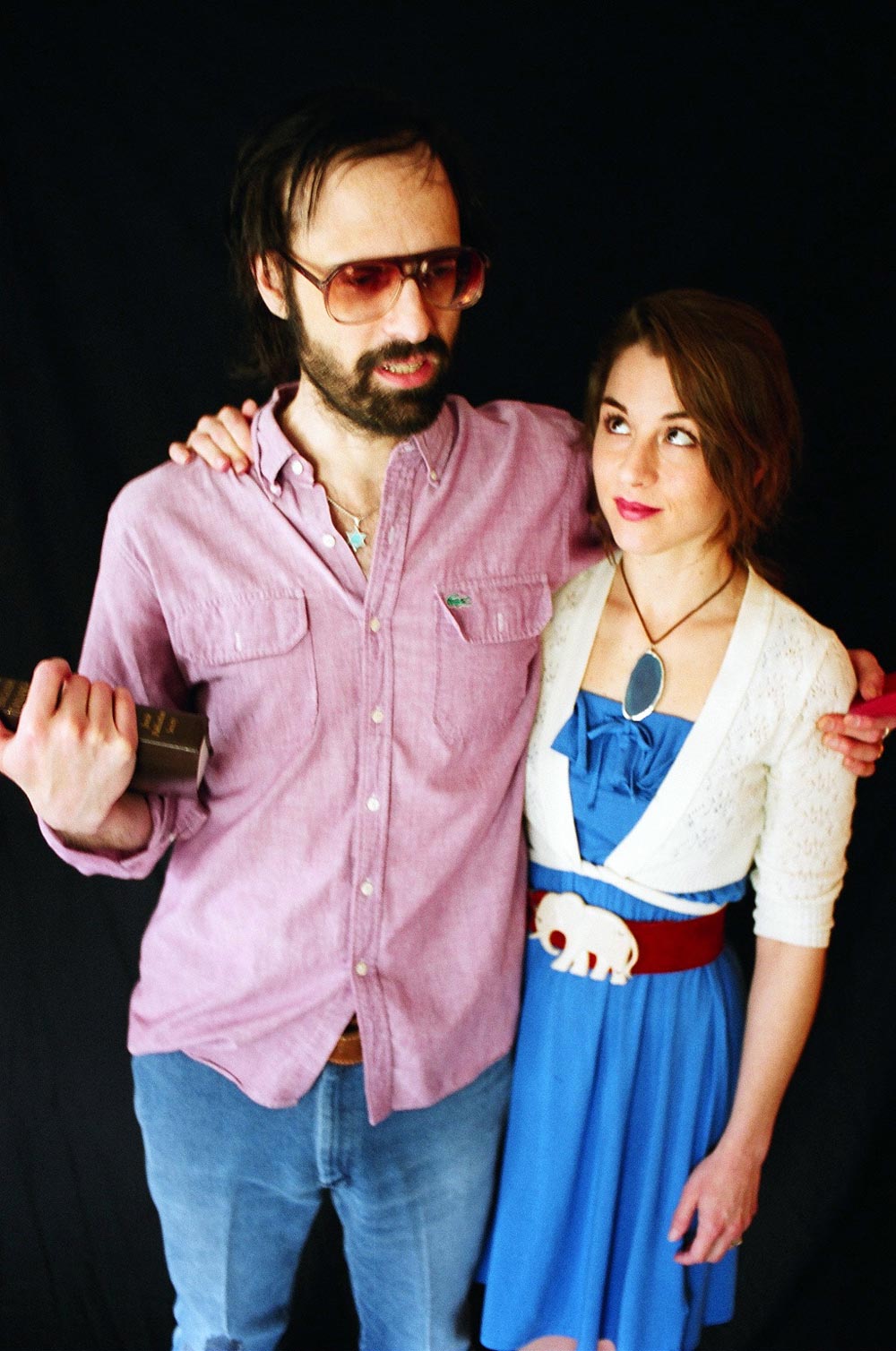 Berman with his wife and musical collaborator Cassie Berman in 2008. (Photo courtesy Drag City)
Berman with his wife and musical collaborator Cassie Berman in 2008. (Photo courtesy Drag City)
Pratt: It’s been tough. We were in pretty regular contact. Sometimes he’d disappear for a while, but we kept in touch. We wrote songs together for 30 years.
In some ways, I appreciate that we kept him around as long as we did. He had a dark take on things at times and struggled with depression and other things. It would have been nice to try to help him through it, but he had a nice long time here and we were all lucky to spend time with him and know him.
Kylie Wright: I think this memorial is going to be very cathartic for a lot of us. I was the one who came up with the idea: Does anybody want to meet down in Charlottesville and pour some whiskey on the ground in front of the old Red House?
We’re kind of worried that it’s getting bigger and bigger and bigger, and what we thought would be 20 people might be now 60. And I keep thinking, David would have loved the chaos of that. He would be delighted by the ensuing chaos.
For those interested in donating David Berman memorabilia to UVA Special Collections, contact [email protected].
Special thanks to Steven Villereal and UVA Special Collections, Kylie Wright, Laura Anderson, and Drag City for the letters, papers and images used in the video atop the page.
Molly Minturn
Managing Editor
University Communications
Original Publication: UVA Today
You are using an old version of Internet Explorer. Our site is developed with the latest technology, which is not supported by older browsers
We recommend that you use Google Chrome for accessing our (or any) website. It is a FREE and modern web-browser which supports the latest web technologies offering you a cleaner and more secure browsing experience.